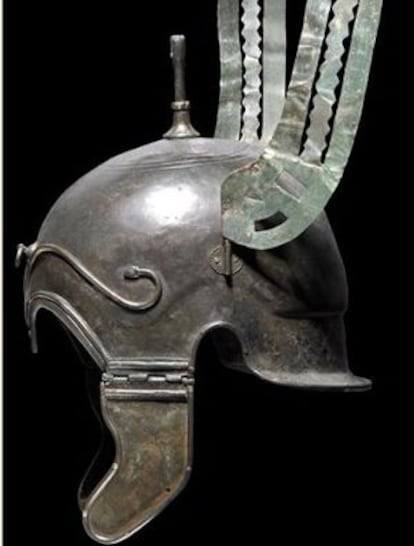Spain’s lost Celtiberian helmets
Archeologists complain that Spain did nothing to hold on to valuable find


A unique set of ancient Celtiberian helmets, 18 in number, unearthed at an archaeological site in the region of Zaragoza, are at the center of a controversy that has seen historians and archaeologists peppering the Ministry of Education, Culture and Sports with questions, and demanding that it act to prevent the sale of these pieces in Germany. The ministry denies it is responsible.
The story surfaced in 2008, when Axel Guttmann's extensive collection was put up for auction in Munich. Then the Romano-Germanic Central Museum, of Mainz (RGZM), denounced the fact that the helmets came from Spain, and must have been exported illegally. The Munich prosecutor put a freeze on the sale of the pieces, and called on the Spanish government to claim its legitimate ownership of them within three months. There was no answer. Several of the helmets have since been sold to new owners.
"Of the thousands of tombs that have been excavated in Spain, there are only a few fragments of helmets; but a military panoply like this one, of 18 helmets, plus swords, lances and daggers, produced in Spain between the third and first centuries B. C., radically changes the picture," says Raimon Graells, a researcher for the RGZM. Together with Alberto Lorrio, of the University of Alicante, and Fernando Quesada, of the Autonomous University of Madrid, he recently denounced the plunder and illegal sale in Germany of these pieces, which came from an archaeological site near Aranda de Moncayo in southwestern Aragón.
For professor Martín Almagro Gorbea, of the Royal Academy of History, "there is no doubt that this is the most important set of armor ever found in the Western Mediterranean region." All are appalled that the Spanish administration did nothing to recover the helmets, or prevent their sale. Their complaints have been brought to the Culture Ministry, and the Ombudsman. The ministry says that "the proper administrative and legal steps were taken," and that, after requesting in 2009 a report from the National Police to the National Historical Trust, a judge in Madrid "closed the case in 2011 for lack of sufficient evidence."
The Supreme Court's Environment and Urbanism Prosecutor's Office, however, disagrees, and opened proceedings last October. In the words of the chief prosecutor Antonio Vercher, "the pertinent steps are being taken to see whether there was tolerance, negligence and lack of determination on the part of the administration."
He says the Civil Guard and Interpol are looking into the matter.
With the inaction of the Spanish authorities, the pieces came up for auction again in 2009 and 2010. At least eight helmets have been sold, for prices as high as 77,000 euros.
"We are convinced there is a margin for recovering the pieces — at least the ones recently sold, which have gone to private collections in France and Spain. The rest were returned to the Guttmann family," says Graells. "It's a pity the ministry took no interest in them," says Lorrio. "They are at least as important as the Odyssey treasure. The Odyssey coins are repetitive, but the helmets are all different, and offer valuable information about who produced them, their influences and their technical knowledge."
As for the possibility of finding more pieces at the same site, Lorrio says prospecting is going on. "I doubt there is anything left, so we have lost the information of the context. We cannot determine why they were buried, and whether it was a ritual offering."
The ministry says that if new proof appears about the export and illicit sale, the case will be reopened, "because we wish to recover this part of our heritage."
Tu suscripción se está usando en otro dispositivo
¿Quieres añadir otro usuario a tu suscripción?
Si continúas leyendo en este dispositivo, no se podrá leer en el otro.
FlechaTu suscripción se está usando en otro dispositivo y solo puedes acceder a EL PAÍS desde un dispositivo a la vez.
Si quieres compartir tu cuenta, cambia tu suscripción a la modalidad Premium, así podrás añadir otro usuario. Cada uno accederá con su propia cuenta de email, lo que os permitirá personalizar vuestra experiencia en EL PAÍS.
¿Tienes una suscripción de empresa? Accede aquí para contratar más cuentas.
En el caso de no saber quién está usando tu cuenta, te recomendamos cambiar tu contraseña aquí.
Si decides continuar compartiendo tu cuenta, este mensaje se mostrará en tu dispositivo y en el de la otra persona que está usando tu cuenta de forma indefinida, afectando a tu experiencia de lectura. Puedes consultar aquí los términos y condiciones de la suscripción digital.








































